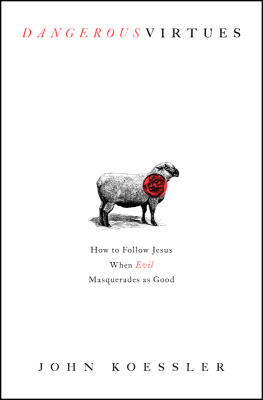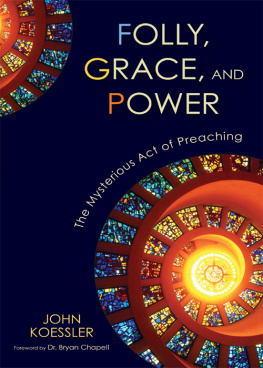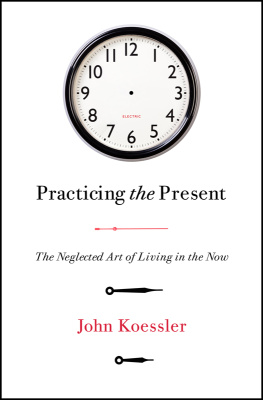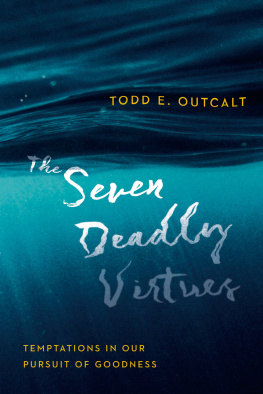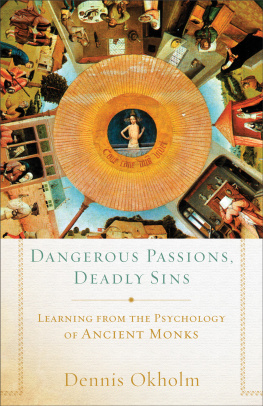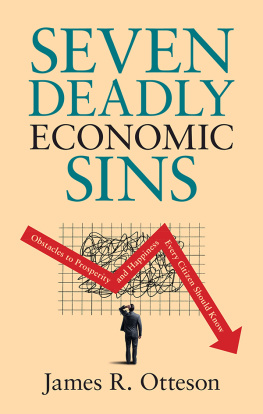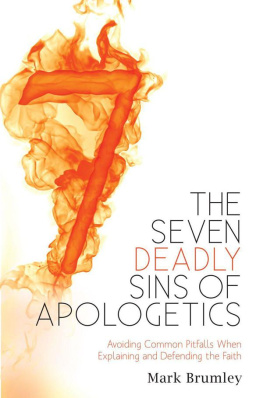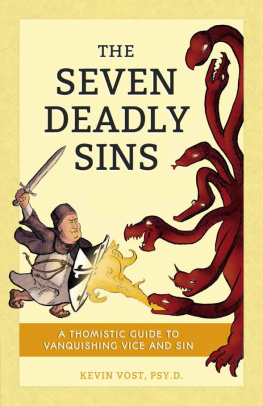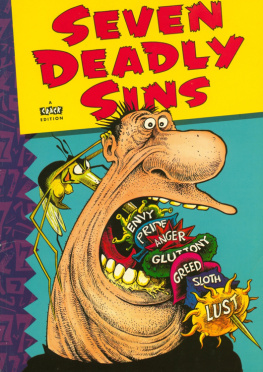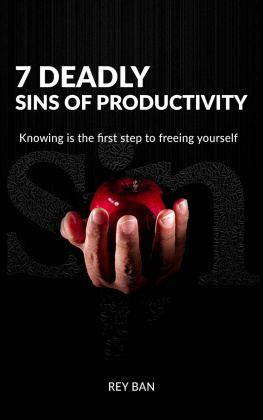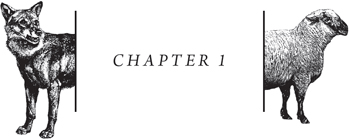Guide

Praise for Dangerous Virtues
We live in an upside-down world where good is rebranded as evil, and wrong is celebrated as right. John Koesslers bracing, relatable book is meant to reorient us to Gods goodness so we can live with clarity, obedience, and true joy. Dangerous Virtues is a modern exploration of the seven deadly sins, calling readers to ask hard questions of the cultural norms that form our lives and churches while pointing us toward everyday moral choices that reflect the character of God.
MICHELLE VAN LOON
Author of Becoming Sage: Cultivating Maturity, Purpose, and Spirituality at Midlife
John Koessler, professor emeritus of pastoral studies at Moody Bible Institute, pens an honest, unsettling, and helpful book for all who have ears to hear. Dangerous Virtues shows its author to be experienced in the cure of souls. The good doctor makes a difficult but needed diagnosis of our culture: what we used to regard as vice is now virtue; the seven deadly sins are now the seven dangerous virtues. Koesslers prescription is clear, attractive, and full of wisdom. Does he have a remedy for Christians? Christian virtue is choosing to live according to Gods Word. But before we do this, we must embrace the gospel to learn who we are. Then, even though God in Christ has forgiven believers, sin is still very much with us. This medicine is not new, but it is biblical: we must put sin to death through the power of Jesuss death as we walk by faith relying on the Holy Spirit.
ROBERT A. PETERSON
Theologian and author of The Assurance of Salvation: Biblical Hope for Our Struggles
Everyone should read a book on the seven deadly sins, sins often sentimentalized, or, as John Koessler wisely notes, rehabilitated. Our chronic hungers, encouraged by cultural erosion and technological obsession, must be recognized for what they are, then converted, retrained, and limited for the sake of Christian virtue. Gluttony, not just overeating, can also be overly careful eating; leisure used thoughtlessly easily becomes sloth, prosperity slips into greed, and a vision for social justice may fuel anger. As this colorfully written, biblically founded, well-researched book argues, sin, dressed respectably, infects everything. To be truly Christian, we need to know ourselves. This book is the opening to conviction.
ROSALIE DE ROSSET
Professor of Communications and Literature, Moody Bible Institute

2020 by JOHN KOESSLER
All rights reserved. No part of this book may be reproduced in any form without permission in writing from the publisher, except in the case of brief quotations embodied in critical articles or reviews.
Scriptures taken from the Holy Bible, New International Version, NIV. Copyright 1973, 1978, 1984, 2011 by Biblica, Inc. Used by permission of Zondervan. All rights reserved worldwide. www.zondervan.com The NIV and New International Version are trademarks registered in the United States Patent and Trademark Office by Biblica, Inc.
Published in association with Mark Sweeney & Associates
Edited by Kevin P. Emmert
Interior Design: Erik M.Peterson
Cover Design: Faceout Studio
Cover illustration of sheep copyright 2019 by Nastasic / Getty Images (657039204). All rights reserved.
Cover illustration of wolf copyright 2019 by nicoolay / Getty Images (184935577). All rights reserved.
All websites and phone numbers listed herein are accurate at the time of publication but may change in the future or cease to exist. The listing of website references and resources does not imply publisher endorsement of the sites entire contents. Groups and organizations are listed for informational purposes, and listing does not imply publisher endorsement of their activities.
Library of Congress Cataloging-in-Publication Data
Names: Koessler, John, 1953- author.
Title: Dangerous virtues : how to follow Jesus when evil masquerades as good / John Koessler.
Description: Chicago : Moody Publishers, 2020. | Includes bibliographical references. | Summary: When sin is disguised as virtue, the path to cultivating righteousness becomes impossible. Dangerous Virtues examines how to recognize these seven deadly sins as they are subtly disguised in todays culture. Christians must develop a discerning eye in a world where good is called evil and evil called good-- Provided by publisher.
Identifiers: LCCN 2020015689 (print) | LCCN 2020015690 (ebook) | ISBN 9780802419644 (paperback) | ISBN 9780802498564 (ebook)
Subjects: LCSH: Deadly sins. | Good and evil--Religious aspects--Christianity. | Virtues.
Classification: LCC BV4626 .K64 2020 (print) | LCC BV4626 (ebook) | DDC 241/.3--dc23
LC record available at https://lccn.loc.gov/2020015689
LC ebook record available at https://lccn.loc.gov/2020015690
Originally delivered by fleets of horse-drawn wagons, the affordable paperbacks from D. L. Moodys publishing house resourced the church and served everyday people. Now, after more than 125 years of publishing and ministry, Moody Publishers mission remains the sameeven if our delivery systems have changed a bit. For more information on other books (and resources) created from a biblical perspective, go to: www.moodypublishers.com or write to:
Moody Publishers
820 N. LaSalle Boulevard
Chicago, IL 60610
Friend,
Thank you for choosing to read this Moody Publishers title. It is our hope and prayer that this book will help you to know Jesus Christ more personally and love Him more deeply.
The proceeds from your purchase help pay the tuition of students attending Moody Bible Institute. These students come from around the globe and graduate better equipped to impact our world for Christ.
Other Moody Ministries that may be of interest to you include Moody Radio and Moody Distance Learning. To learn more visit www.moodyradio.org and www.moody.edu/distance-learning.
To enhance your reading experience weve made it easy to share inspiring passages and thought-provoking quotes with your friends via Goodreads, Facebook, Twitter, and other booksharing sites. To do so, simply highlight and forward. And dont forget to put this book on your Reading Shelf on your book community site.
Thanks again, and may God bless you.
The Moody Publishers Team
I n 1987, Harpers Magazine invited seven ad agencies to create a humorous campaign designed to rehabilitate the reputation of the seven deadly sins. The ad for lust pictured two silent film stars in a passionate embrace along with a headline that read, Any sin thats enabled us to survive war, death, pestilence, and famine cant be called deadly. The ads tagline read, Lust, where would we be without it? Another, for the Gluttony Society, showed a grossly obese man running in a raceor perhaps competing in the long jumpwith the slogan, Be all you can be. The ad for pride declared, Its time to start feeling good about yourselfreally good.
Although tongue in cheek, these ads accurately reflect the modern consensus when it comes to sin. We are sinners. We dont deny it. But most of the time, we dont think much about it. We dont seem to obsess about sin the way the ancients used to, at least not about our own sins. We dont punish ourselves or go to extreme measures to fight sin off. Most of the time, our sin feels more like a low-grade fever than it does a raging fire. Its presence is an ongoing irritation that may hinder us from being our best, but it doesnt keep us from functioning. Sin doesnt bother us that much, either. If anything, the fact that we are sinners serves as an escape clause when things go badly. What did you think would happen? we want to say. We are imperfect people living in an imperfect world. Of course, we went off the rails. The fact that we are sinners is one of the few religious concepts upon which a majority of people agree. Most people identify with the label sinner.

